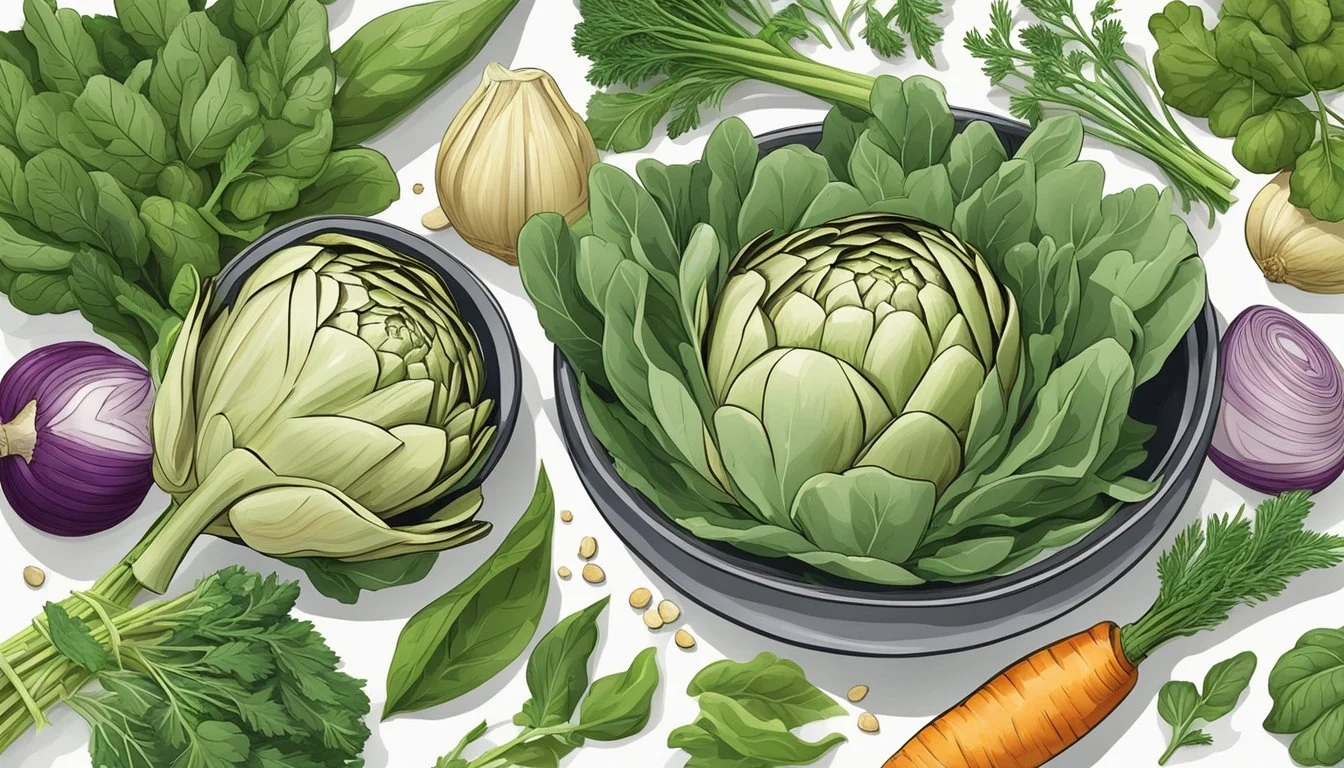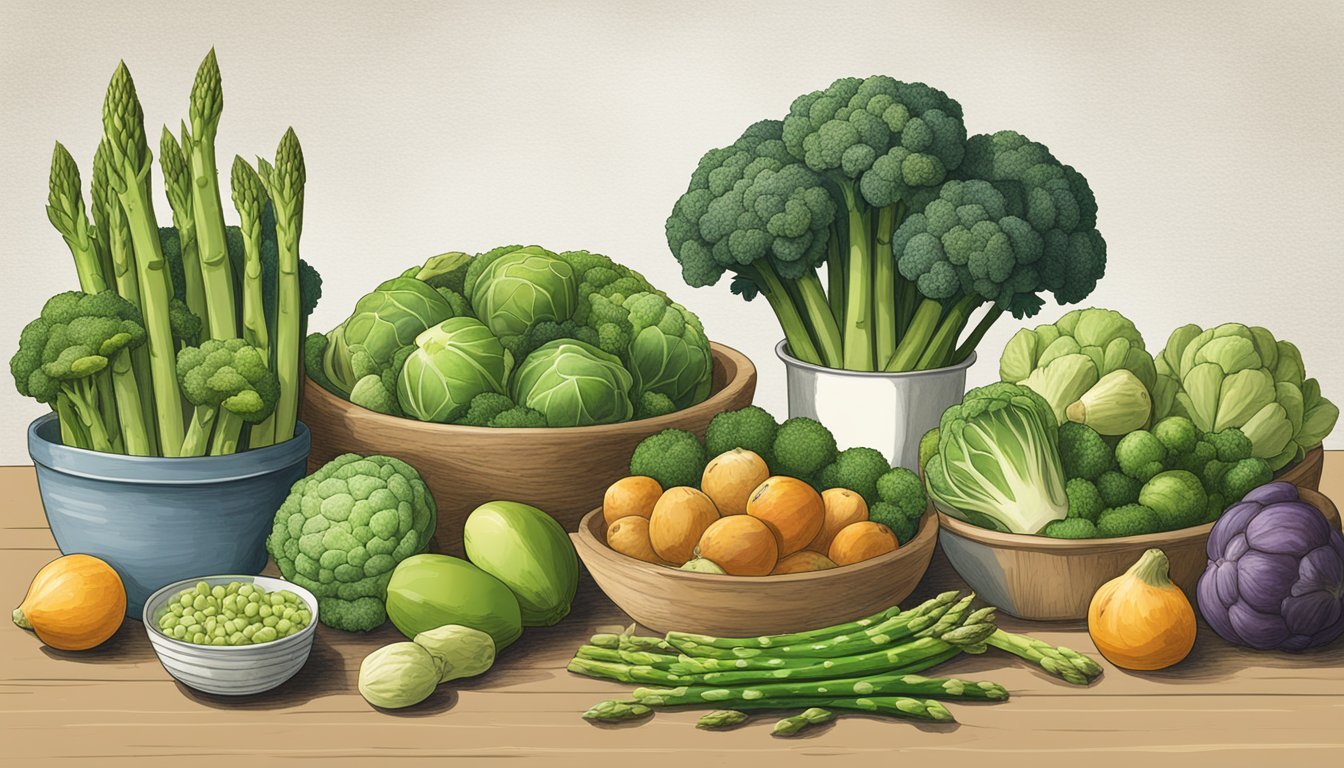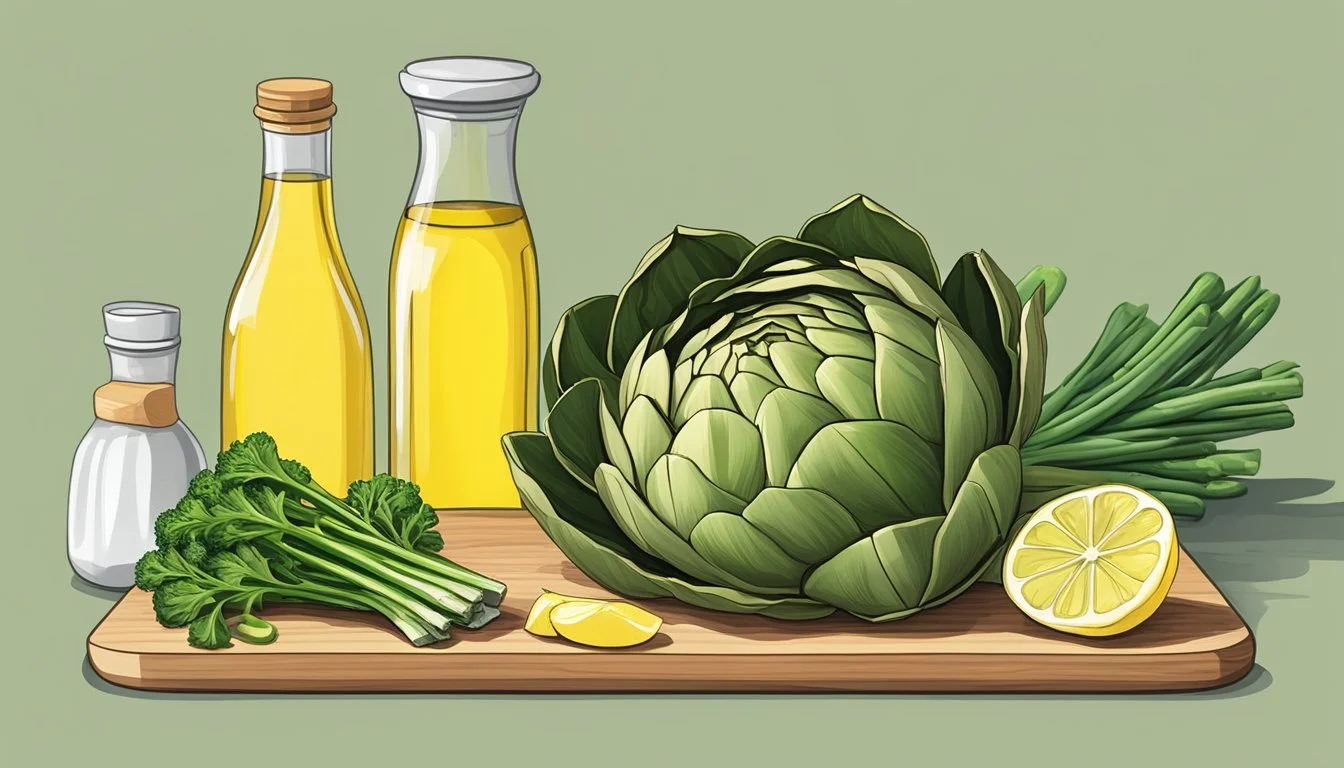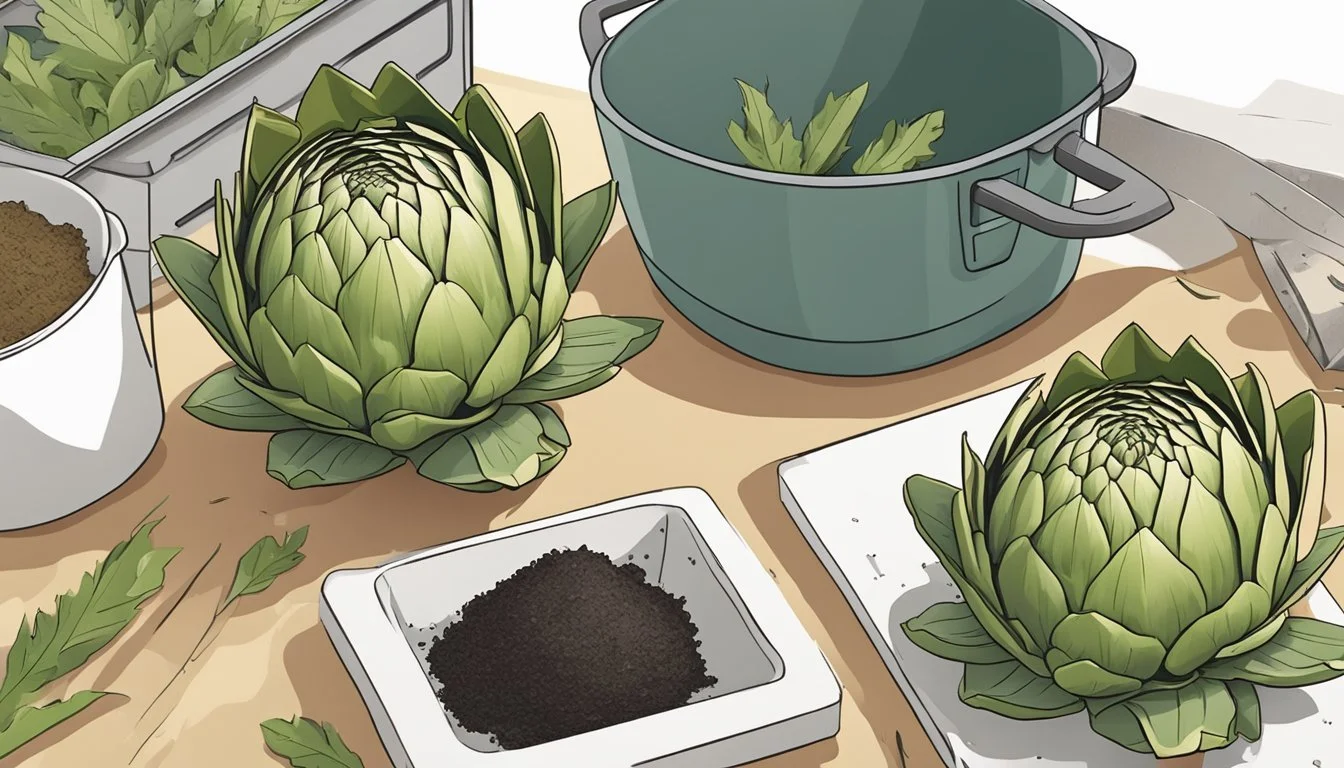Artichokes Substitutes
Best Alternatives for Cooking
Artichokes, with their unique texture and flavor, add significant value to many recipes. Yet, they are not always available or suitable for every dish. Substituting artichokes can be simple, with many accessible and tasty alternatives that maintain the integrity and deliciousness of your meals.
Brussels sprouts are a versatile substitute, offering a similar texture when cooked and a delightful match in butter-garlic sauces. Asparagus also makes a viable replacement, especially when grilled or roasted, adding a tender-crisp element to salads or pasta dishes. For those looking for something with a slightly nutty flavor, bamboo shoots can stand in effectively, providing a pleasant crunch to various recipes.
From canned artichokes to the heart of the palm, there is a range of substitutes ensuring you never miss out on the essential qualities that artichokes bring to your culinary creations. This guide will explore the best artichoke alternatives, helping you to effortlessly adapt and enjoy your favorite recipes.
Understanding Artichokes
Artichokes are known for their unique earthy and nutty flavor and tender texture. They offer a host of nutritional benefits and are versatile in cooking, making them a beloved ingredient in various recipes.
Characteristics of Artichokes
Artichokes are large, thistle-like plants with a distinctive appearance. The edible parts include the heart, the tender inner leaves, and the stem, once peeled. The outer leaves, however, are tough and difficult to eat.
Inside, they contain a fibrous section known as the choke, which is inedible and needs to be removed. The flesh of the leaves is tender and can be scraped off with the teeth, while the heart is prized for its delicate, meaty texture.
Nutritional Profile
Artichokes are not just flavorful; they are also packed with nutrients. They are rich in fiber, vitamin C, and potassium, and provide a good amount of iron, calcium, magnesium, phosphorus, and manganese.
Additionally, artichokes contain antioxidants that help combat oxidative stress in the body. Their low calorie count, combined with these nutritional benefits, makes them an excellent choice for health-conscious individuals.
Culinary Uses
Artichokes are incredibly versatile in the kitchen. They can be used in a variety of dishes ranging from appetizers to main courses. Popular cooking methods include boiling, steaming, roasting, and grilling.
They can be incorporated into pastas, salads, dips, sauces, soups, and stews. Artichokes also make a wonderful topping for pizzas and bread, and can be enjoyed as standalone roasted delights. Their unique flavor enhances most dishes, providing an earthy and nutty complement to various ingredients.
Choosing Artichoke Substitutes
Different factors influence the choice of artichoke substitutes, including texture, flavor, and nutritional value. By categorizing substitutes, readers can quickly identify suitable alternatives for various cooking methods and preferences.
Factors to Consider
Texture and Flavor: The texture and flavor of the substitute should closely resemble that of artichokes. For example, Brussels sprouts offer a similar crunchy exterior and tender interior, making them suitable for recipes requiring longer cooking times. Bamboo shoots add a mildly nutty flavor and crisp texture, ideal for stir-fries.
Nutritional Value: It's important to consider the nutritional profile of the substitute. Jerusalem artichokes are rich in vitamin C, phosphorus, and potassium, which can be beneficial for those seeking a nutritious alternative.
Availability and Convenience: Availability of the substitute in local markets and ease of preparation are also key. Fresh produce like asparagus may be more accessible and convenient to use, while canned artichokes offer a quick and easy replacement.
Cooking Method: The chosen substitute should align with the cooking method of the recipe. For grilling or roasting, substitutes like asparagus or Brussels sprouts work well. For salads, shaving raw asparagus can mimic the texture of raw artichokes.
Substitute Categories
Vegetables: Common vegetable substitutes include Brussels sprouts, asparagus, and bamboo shoots. Their varied textures and flavors make them versatile for different recipes. Brussels sprouts work well in butter-garlic sauces, while asparagus can be grilled or roasted.
Canned Goods: Canned artichokes provide a convenient and time-saving option. They are often already prepped and ready to use, which can be beneficial for quick meals. They work well in salads, dips, and pastas.
Fresh Produce: Fresh alternatives like the heart of palm and Jerusalem artichokes offer unique flavors and textures. The heart of palm can replace artichokes in dishes requiring a tender, slightly crunchy texture. Jerusalem artichokes are great for adding a nutty flavor to various recipes.
Evaluating these factors and categories will help in selecting the best artichoke substitute, ensuring that the dish retains its intended flavor and texture. Considering nutritional value and availability further enhances the overall cooking experience.
Common Artichoke Substitutes
When fresh artichokes are unavailable, there are many vegetables and processed alternatives that can serve as excellent replacements in both flavor and texture.
Vegetable Alternatives
Asparagus: Both grilled and roasted asparagus offer a tender-crisp texture similar to artichokes. These can be used in salads, pastas, and as standalone side dishes. Shaved raw asparagus is also suitable for recipes requiring raw artichoke.
Brussels Sprouts: With their buttery interior and crunchy exterior, Brussels sprouts are effective substitutes, especially in dishes that require longer cooking times. They absorb sauces well and work wonderfully in sautéed and roasted preparations.
Jerusalem Artichokes: Also known as sunchokes, these tubers provide a slightly nutty flavor. Their crisp texture when raw and creamy consistency when cooked make them versatile for a range of dishes.
Kohlrabi: Offering a mild and sweet flavor, kohlrabi can mimic the texture of artichokes in salads and slaws. When cooked, it takes on a tender yet firm texture, making it a good addition to stews and roasts.
Broccoli Stems: Often discarded, broccoli stems have a mild taste and can be peeled and sliced thinly to use in place of artichokes in salads, stir-fries, or casseroles.
Cabbage and Napa Cabbage: Both varieties can replace artichokes in grilled or steamed dishes. Napa cabbage adds a milder, more tender texture, while regular cabbage has a robust crunch.
Prepared and Processed Substitutes
Hearts of Palm: Derived from the inner core of various palm trees, hearts of palm is a close match in texture and subtle flavor to artichoke hearts. Ideal for salads, antipastos, and even vegan seafood dishes.
Canned Artichokes: These are a convenient alternative for fresh artichokes. Already prepared and preserved, they can be quickly added to recipes without the need for extensive preparation, maintaining much of the original flavor and texture.
Bamboo Shoots: Frequently used in Asian cuisine, bamboo shoots can effectively replace artichoke hearts. They offer a mild sweetness and crunchy texture, suitable for stir-fries, soups, and salads.
Jicama: Known for its crisp texture and mildly sweet taste, jicama can be julienned or diced to substitute in raw salads or can be cooked to soften and used in various dishes.
Frozen Artichokes: Another handy option, frozen artichokes retain much of the texture and flavor of fresh varieties. These can be used directly from the freezer into cooked dishes like pasta, casseroles, or dips.
Alternative Preparations and Recipes
Alternative preparations for artichoke substitutes can introduce diverse flavors and textures into your dishes. Depending on the substitute chosen, you can enjoy a range of culinary experiences from grilling and roasting to stewing and steaming.
Recipes for Substitutes
When using substitutes like Jerusalem artichokes, these can be thinly sliced and fried for a crispy snack or added to stews for a sweet and nutty taste. Brussels sprouts can be grilled or roasted with olive oil, salt, and garlic to enhance their earthy flavor. Chayote can be steamed and tossed in a salad for a crunchy texture.
A simple salad recipe might include:
Steamed chayote, diced
Mixed greens
Goat cheese
Balsamic vinaigrette
For a warm dish, try braising Brussels sprouts with sage and butter for a rich and aromatic side.
Herbs and Spices Pairings
Pairing the right herbs and spices can elevate the flavors of artichoke substitutes. Brussels sprouts benefit from fresh thyme and a touch of nutmeg when roasted. Jerusalem artichokes pair well with earthy herbs like sage and rosemary, particularly when included in soups or roasted dishes.
For a punchy flavor, add a sprinkle of smoked paprika to grilled asparagus, and enhance the taste with a drizzle of lemon-butter sauce.
Chayote works beautifully with cilantro and lime, perfect for a refreshing salad or side dish.
Health Considerations
Choosing appropriate substitutes for artichokes can enhance a dish’s nutritional profile while catering to diverse dietary needs. This section delves into the health benefits and potential concerns related to common artichoke substitutes.
Benefits of Artichoke Substitutes
Artichoke substitutes like kohlrabi, asparagus, and Jerusalem artichokes bring a wealth of nutrients. Kohlrabi is notably high in Vitamin C and low in calories, making it both a nutritious and weight-friendly option. Asparagus provides ample antioxidants, fiber, and vitamins like B-6 and thiamin, as well as minerals, including calcium and potassium.
Jerusalem artichokes also offer a good dose of vitamins and minerals, including potassium and phosphorus. These substitutes can help meet dietary recommendations for various nutrients while fitting into vegetarian and gluten-free diets. The inclusion of such substitutes can contribute positively to overall health, bolstering the immune system, aiding digestion, and helping to maintain healthy blood pressure levels.
Allergies and Dietary Restrictions
When selecting artichoke substitutes, it's essential to consider potential allergies and dietary restrictions. Kohlrabi and asparagus are typically safe for most individuals, but those with specific allergies to cruciferous vegetables or Liliaceae family plants should avoid them. Jerusalem artichokes, while nutritious, may cause digestive discomfort in some people due to high inulin content.
For those with gluten intolerance or celiac disease, asparagus and bamboo shoots are excellent gluten-free options. Heart of palm and Brussels sprouts are also suitable for various specialized diets, including vegetarian and vegan lifestyles. Always check for individual allergies and consult health professionals if uncertain about incorporating a new food into your diet.
Storage and Preparation Tips
Understanding how to store and prepare artichoke substitutes ensures they maintain their texture and flavor. Proper techniques will also extend their shelf life and enhance their convenience in various recipes.
Storing Substitutes
Different substitutes require specific storage methods to preserve their quality. Mushrooms should be kept in a paper bag in the refrigerator to prevent moisture buildup, extending their shelf life to about one week. Brussels sprouts, another excellent substitute for artichokes, benefit from being stored in a perforated plastic bag in the fridge, which helps them stay fresh for up to five days.
Kohlrabi and bamboo shoots need refrigeration as well. Unpeeled kohlrabi can last up to a week in the crisper drawer, while bamboo shoots can be stored in an airtight container filled with water, with daily water changes to keep them fresh for up to two weeks. Canned substitutes, such as artichoke hearts or bamboo shoots, should be stored in a cool, dry place and can last several months to years before opening. Always refrigerate any unused portions in an airtight container and use within a few days.
Preparing Substitutes
When preparing artichoke substitutes, start with thorough cleaning to remove dirt and debris. Mushrooms should be wiped with a damp cloth instead of rinsing to prevent water absorption, which can affect their texture. Trim the ends of Brussels sprouts, and remove any yellow or damaged outer leaves before cooking.
Kohlrabi needs to be peeled before use due to its tough outer layer. Slice or dice according to recipe requirements. For bamboo shoots, peel and cut into desired shapes. If using canned substitutes, drain and rinse under cold water to remove any brine or preservatives.
These preparation steps help retain the flavor and improve the overall eating experience, enhancing the convenience of using these substitutes in various dishes.







